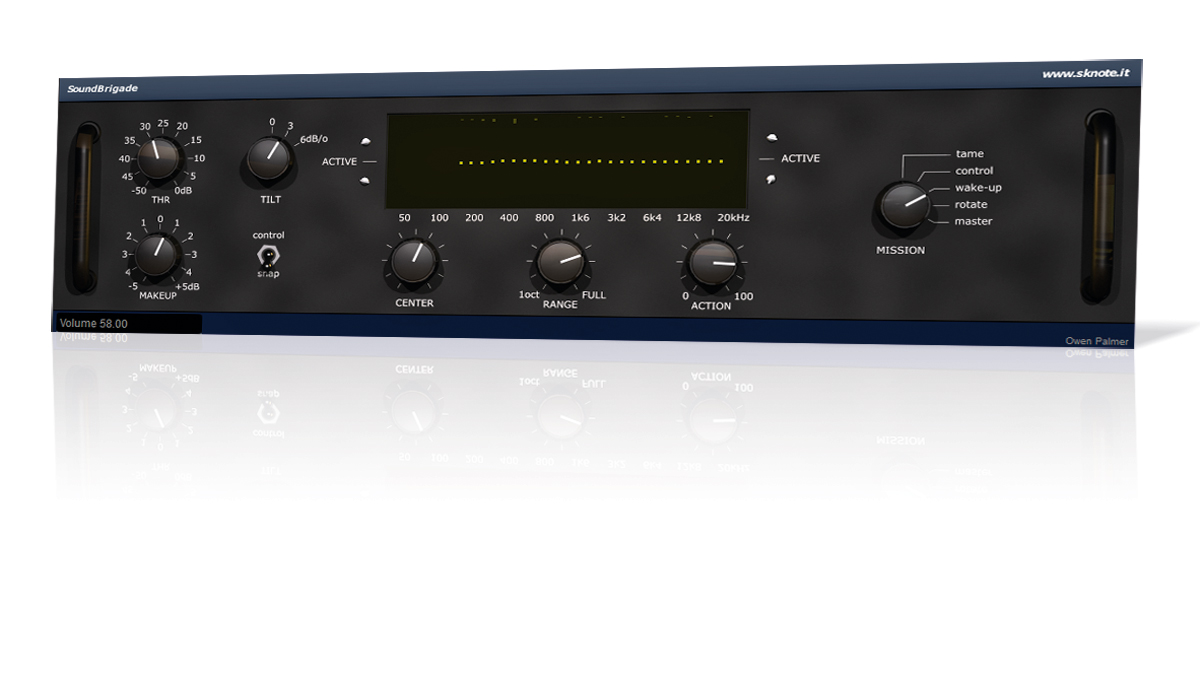MusicRadar Verdict
A brilliant solution to all sorts of sonic problems, this is a must-have engineering and sound design utility at a great price.
Pros
- +
Quick results. Novel design. Easy to use. Useful Action knob. Good range of Missions.
Cons
- -
Some minor GUI annoyances.
MusicRadar's got your back
To the uninitiated, SoundBrigade (VST/AU) might appear a little out of the ordinary - and it is, but in the most brilliant way.
It's a mixing and mastering processor based on a bank of 25 evenly distributed filters, and the idea is that as you lower the Threshold control, the filters start to react to the input signal (instrument or full mix) a lot like a dynamic EQ.
The great thing about it, though, is that you don't have to dedicate a significant chunk of your life to learning or configuring the filters, as the plugin does the legwork for you.
All you have to do is pick from one of five 'Missions', which are sort of like presets that determine how the filters behave when frequencies pass the Threshold.
The centre points of all 25 filters are shifted together with the Center knob, and the Range knob is used to spread them out over anywhere from one octave to the whole audible frequency spectrum - usually, you'll want to set this to at least cover the frequency span of the sound you're operating on.
On a Mission
The Tame Mission is designed to address a specific problematic frequency area by attenuating frequencies above the Threshold, thus dynamically neutralising the frequency curve somewhat. It could be deployed as a de-esser if you need to soften some harsh sibilance in a voice, for example. The result is a sound that's sweeter, perhaps a little more present overall, and nicely polished.
The Control Mission works in a similar way, except that it applies upward gain to frequencies below the Threshold as well as downward gain to frequencies above it. It's fantastic at bringing out low-level details in vocals and other live recorded instruments.
The Wake-Up Mission exaggerates the dynamics of each frequency, making peaks louder and troughs quieter, according to where you set the Threshold. This enables a whole new approach to adding detail and definition to drum loops or synth parts, for example.
Rotate doesn't apply any gain and so doesn't respond to Threshold adjustment. Rather, it uses phase rotation to produce futuristic zapping sounds. This Mission is awesome for sound design and can turn a boring old drum kit into a pounding synthetic machine.
Finally, our favourite Mission, Master, is a lot like Tame, but with a much more detailed response to the incoming signal. Rather than gently softening a broad frequency range, it represses any small resonances that might be present at several points along the frequency curve.
It's intended for mastering usage, but it can pretty much be thrown over any sound that's having issues in the frequency domain, even if you haven't quite figured out exactly where they are. With the filters spread out over the full range - which we'd recommend - the Master Mission typically takes only a few seconds to set up.
Our only real complaint with SoundBrigade is that it's a little tricky to switch Missions in a hurry using the stepped dial - we'd rather be able to click directly on the name of each one to select it.
All in all, though, the whole thing works very well indeed, and it's surprising how intuitive the process of applying it becomes after just a few minutes testing out each Mission.
Computer Music magazine is the world’s best selling publication dedicated solely to making great music with your Mac or PC computer. Each issue it brings its lucky readers the best in cutting-edge tutorials, need-to-know, expert software reviews and even all the tools you actually need to make great music today, courtesy of our legendary CM Plugin Suite.
““We were arguing a lot and we were miserable”: How Green Day exceeded expectations with their most ambitious song
"There’s plenty for us guitarists to learn – and ‘less is more’ is the overriding lesson": how to play like George Harrison on The Beatles' Abbey Road
“They didn’t like Prince’s bikini underwear”: Prince’s support sets for the The Rolling Stones in 1981 are remembered as disastrous, but guitarist Dez Dickerson says that the the crowd reaction wasn’t as bad as people think











